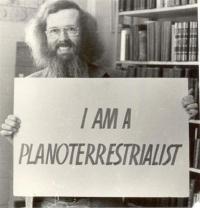Leo Charles Ferrari

Photo: Flat Earth Society wiki
Leo Charles Ferrari (philosophy professor, poet, and author) was born 8 December 1927 in Bathurst, New South Wales, Australia to Leo Francis and Millicent Josephine Muller. He died 7 October 2010 in Fredericton, New Brunswick, leaving behind his wife Lorna Drew with whom he wrote a book documenting the affects of Alzheimer’s disease. This book is entitled Different Minds: Living with Alzheimer’s Disease (2005).
Ferrari spent the first part of his life living in Australia where he attended an all boys Christian school, St. Patrick’s College (Christian Brothers Colleges), in Strathfield. He went on to receive his BSc from the University of Sydney in 1948. After university, he worked as an industrial chemist by day and studied medieval philosophy at night. In 1955, he immigrated to Canada to study philosophy at Laval University in Quebec, eventually earning his PhD. Soon after graduating, he accepted a position as lecturer at Saint Mary’s University in Halifax, Nova Scotia where he worked from 1957 until 1958. Ferrari then taught at Mount Saint Vincent University, also in Halifax, for three years. While living in Nova Scotia, he spent a year as President of Grosvenor Park Home and School Association.
Ferrari’s life in New Brunswick began when he was appointed as an assistant professor of Philosophy in 1961 at St. Thomas University (STU)—the campus located in Chatham which has since moved to Fredericton. He moved to Fredericton with the University in 1964 and became a full professor in 1971. Ferrari was an Honorary Research Associate of the Graduate School at the University of New Brunswick, and the first chair (1965) of the Executive Committee of St. Thomas University Faculty Association (currently known as FAUST).
Ferrari was extensively involved in Human Rights during his time at St. Thomas University. He co-founded the Save-A-Family Plan—an organization that helps destitute families in India—and wrote several books and articles for the New Brunswick Human Rights Commission about racial discrimination. The Rise of Human Rights: a Canadian Outline was published by the New Brunswick Human Rights Commission in 1970, as was Human Rights and The Canadian Indian (1973). Human Rights in a Changing World: The Problem of Preserving Human Values in the Upheavals Caused by Science and Technology followed in 1975.
Ferrari’s main scholarly passion was the fifth-century Latin philosopher St. Augustine of Hippo. After retiring from teaching at STU in 1995, Ferrari focused his work on the life and thought of the Latin philosopher. He was only the fourth Canadian to deliver the prestigious Saint Augustine Lecture at Villanova University, Pennsylvania, in 1982. Ferrari received a fellowship to assist his work on Augustine in Europe and a fellowship from the Deutscher Akademischer Austauschdienst to study St. Augustine at the Goethe Institut in Germany.
On 8 November 1970, Ferrari and some of his friends, Raymond Fraser and Alden Nowlan, co-founded the Flat Earth Society of Canada. The organization was created with the purpose of restoring confidence in the validity of one’s own sense perceptions; the movement was in response to science’s insistence on things unseen. Ferrari worried that people were being influenced so strongly by science and technology that they had lost touch with their own bodies and rational conclusions. Ferrari wrote articles, gave newspaper interviews, and appeared on numerous television and radio programs to discuss this organization, which attracted international curiosity.
Ferrari also published creative writing. His poetry is modernist and terse, with an abundance of humour and satire. His work explores matters such as life, death, education, and identity, but always with wit and a light touch. His trip to Germany, for example, inspired many poems about geographic and cultural dislocation.
Well-known poet Alden Nowlan wrote the preface for Ferrari’s book Over the Edge (1977), stating that his friend “was born with the gift of laughter and the belief that the world was mad” (9).
In the Spring of 1998, Ferrari was the first person to be named Professor Emeritus at STU.
Jennifer Pretty and Allie Brubacher, Winter 2009
St. Thomas University
Bibliography of Primary Sources
Drew, Lorna, and Leo Ferrari. Different Minds: Living With Alzheimer Disease. Fredericton, NB: Goose Lane Editions, 2005.
Ferrari, Leo C. The Conversions of Saint Augustine. Villanova, PA: Villanova UP, 1984. Saint Augustine Lecture 1982.
---. Human Rights and the Canadian Indian. Fredericton, NB: Human Rights Commission, 1973.
---. Human Rights in a Changing World: The Problem of Preserving Human Values in the Upheavals Caused by Science and Technology. Fredericton, NB: Human Rights Commission, 1977.
---. Over the Edge: Poems in Grateful Celebration of Fifty Years of Life, Love and of Laughter. Fredericton, NB: Owl and the Pussycat, 1977.
---. The Rise of Human Rights: A Canadian Outline. Fredericton, NB: Human Rights Commission, 1970.
---. The Worm’s Revenge. Fredericton, NB: Mortuary, 1968.
Ferrari, Leo C., Rodney H. Cooper, Peter M. Ruddock, et al. Concordantia in Libros XIII Confessionum S. Aurelii Augustini: A Concordance to the Skutella Edition. 1969 ed. Hidelsheim; Züric; New York: G. Olms-Weidmann, 1991. Alpha-Omega, Reihi E., Französische Autoren 124.
Bibliography of Secondary Sources
“Academic Writings.” Leo C. Ferrari Fonds. MG.H168. Archives and Special Collections. Harriet Irving Library. U of New Brunswick, Fredericton, NB.
“Biographical Sketch.” Leo C. Ferrari Fonds. MG.H168. Archives and Special Collections. Harriet Irving Library. U of New Brunswick, Fredericton, NB.
Campbell, Stephen. “He May be Retiring, but He’s Not Slowing Down.” Telegraph-Journal [Saint John, NB] 12 May 1998.
“The Flat Earth Society.” Leo C. Ferrari Fonds. MG.H168. Archives and Special Collections. Harriet Irving Library. U of New Brunswick, Fredericton, NB.
“STU to Honor 6 Long Serving Faculty Members.” The Daily Gleaner [Fredericton, NB] 12 Aug. 1995.
Toner, Patrick. If I Could Turn and Meet Myself: The Life of Alden Nowlan. Fredericton, NB: Goose Lane Editions, 2000.


